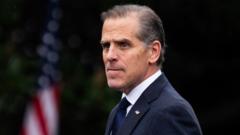In a recent public statement, tech mogul Elon Musk lambasted President Trump's tax and spending bill as a "disgusting abomination," signaling a growing divide within Republican ranks and showcasing tensions between the billionaire and the former president.
**Musk's Sharp Reproach to Trump's Tax Bill Signals GOP Division**

**Musk's Sharp Reproach to Trump's Tax Bill Signals GOP Division**
Elon Musk openly criticizes President Trump's tax plan, highlighting rifts within the Republican Party.
Elon Musk has made headlines with his recent criticism of President Donald Trump's ambitious tax and spending bill, referring to it as a "disgusting abomination" shortly after exiting the administration where he served for 129 days. This open dissent marks a significant shift in Musk's previously supportive stance towards Trump, highlighting the increasing tensions within the Republican Party over fiscal policy and governance.
Last month, the House of Representatives passed the controversial bill, which entails notable tax breaks and increased defense spending, alongside raising the federal borrowing limit by a staggering four trillion dollars. Musk’s remarks expressed grave concern about the projected increase of the national budget deficit, which he estimates could reach $2.5 trillion under the current proposal. His posts on X, a social media platform, reflect a call for accountability among legislators who support the bill, threatening to mobilize against those he deems betrayals to the American public.
Musk, who has previously held significant influence within Trump’s circle and maintained a substantial financial commitment to support Republican causes, now finds himself at odds with party leadership. White House communications director Karoline Leavitt emphasized the administration's unwavering approval of the bill, while Republican leaders, including Senate majority leader John Thune and Speaker Mike Johnson, expressed their commitment to advancing the legislation despite Musk's criticisms.
The bill, which extends previous tax cuts and earmarks funding for defense and immigration enforcement, has encountered opposition from more fiscally conservative Republicans. Notably, Senator Rand Paul has voiced his refusal to support any legislation that raises the debt ceiling, suggesting a potential rift within the GOP that could hinder party unity going forward.
Interestingly, some Democrats have viewed Musk's denunciation as an endorsement of their opposition to the bill. Senate Minority Leader Chuck Schumer highlighted Musk’s standing as a token of the bill's shortcomings. Meanwhile, Musk's concerns reportedly extend beyond fiscal implications to include operational disputes regarding the FAA and the potential impact on his business interests with Tesla.
As the legislative timeline tightens ahead of a July 4 deadline for approval, the party faces challenges in reconciling differing viewpoints while attempting to maintain a cohesive front. Musk’s critique serves as a stark reminder of the shifting dynamics within the Republican landscape, particularly as Trump navigates his still-influential role amidst dissent from prominent allies.
Last month, the House of Representatives passed the controversial bill, which entails notable tax breaks and increased defense spending, alongside raising the federal borrowing limit by a staggering four trillion dollars. Musk’s remarks expressed grave concern about the projected increase of the national budget deficit, which he estimates could reach $2.5 trillion under the current proposal. His posts on X, a social media platform, reflect a call for accountability among legislators who support the bill, threatening to mobilize against those he deems betrayals to the American public.
Musk, who has previously held significant influence within Trump’s circle and maintained a substantial financial commitment to support Republican causes, now finds himself at odds with party leadership. White House communications director Karoline Leavitt emphasized the administration's unwavering approval of the bill, while Republican leaders, including Senate majority leader John Thune and Speaker Mike Johnson, expressed their commitment to advancing the legislation despite Musk's criticisms.
The bill, which extends previous tax cuts and earmarks funding for defense and immigration enforcement, has encountered opposition from more fiscally conservative Republicans. Notably, Senator Rand Paul has voiced his refusal to support any legislation that raises the debt ceiling, suggesting a potential rift within the GOP that could hinder party unity going forward.
Interestingly, some Democrats have viewed Musk's denunciation as an endorsement of their opposition to the bill. Senate Minority Leader Chuck Schumer highlighted Musk’s standing as a token of the bill's shortcomings. Meanwhile, Musk's concerns reportedly extend beyond fiscal implications to include operational disputes regarding the FAA and the potential impact on his business interests with Tesla.
As the legislative timeline tightens ahead of a July 4 deadline for approval, the party faces challenges in reconciling differing viewpoints while attempting to maintain a cohesive front. Musk’s critique serves as a stark reminder of the shifting dynamics within the Republican landscape, particularly as Trump navigates his still-influential role amidst dissent from prominent allies.




















